#migratory may
Text
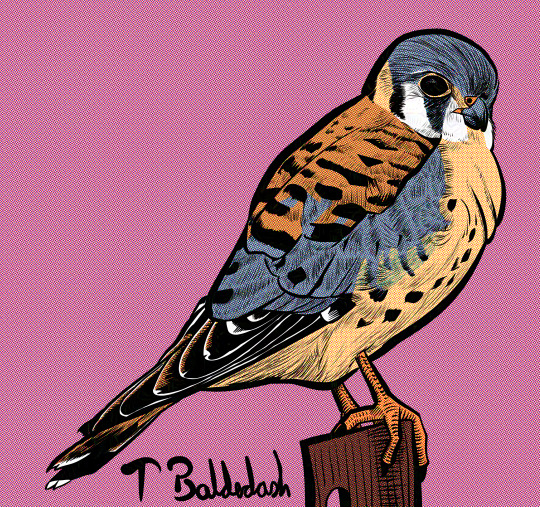
Migratory May day 30: American Kestrel
Reference photo by Michael JD
#migratory may#american kestrel#kestrel#falco sparverius#falco#falconidae#falconiformes#falcon#raptor#bird of prey#bird#birb#birds#bird art#art#digital art#artists on tumblr#tw eyestrain#cw eyestrain#wauk wauk
168 notes
·
View notes
Text

The Broad-Tailed Hummingbird is day 29 of #migratorymay2024 hosted by @migratorymay and @environmentamericas
173 notes
·
View notes
Note
You see the known Sherlock fandom tactics in Loki. I see the same, only from the Supernatural fandom perspective. Same kind of vocabulary, terms, accusations, unhinged analyses. You're absolutely right to call them migratory, they seem to be pulling the same shit in every fandom they're in.
The thing about them that disgusts me the most is that now they are painting some narrative around those fandoms as if they were the poor victims that were 'humiliated' by the evil writers.
“Oh, these writers forced us to invest ourselves in this and it didn't go how we wanted! It's their fault our feefes are hurt!” Like? Did they hear themselves? You know who I blame when I invest myself in a bad show? Myself. Last year I was like that with HOTD, the writing was so bad a child could make it better, but it was my own fault for thinking HBO would actually hire someone competent when they didn't bother the first time. So I stopped watched... and that's it. End of the story, not watching Season 2.
These people acted like complete pieces of shit! Maybe they have deluded themselves into thinking they're poor victims, but getting a jockey 'RIP' from Mark Gatiss after you tweeted him that you'll die if your stupid ship doesn't become canon, doesn't paint you as some little martyrs, but as crazy idiots that couldn't cope with a narrative they don't want to accept.
I swear is like fandoms now forget how fucking nasty these people were to cast and crew and other fans. I remember quite well how they harassed Molly's actress after Season 4 because she shared some script notes on twitter and acted as if they were the poor victims and she didn't understand their 'pain' like... Give me a break.
And yes, same tactics in the Loki fandom: Threatening the actors (remember when they say they would share Tom Hiddleston address and then they kept and keep being shits about Sophia Di Martino), threatening directors (the whole mess with Kate Herron) and the writers like... They literally haven't matured in fifteen years, they are stunted in their pathetic victim complex.
But yeah, keep saying how the writers 'traumatized you'. Honey, you were always like that. The difference between you and the writers is that they have actually moved on like the adults they are.
19 notes
·
View notes
Text
The fact that Kurumi and Kuniharu let the house get dirty enough to attract roaches OTL.... Kusuo literally has to clean up after them. How does the house even get that dirty with no young kids, no pets, and no outdoor shoes in the house? There should only be mess in the kitchen at most from Kurumi having to make 9 meals every day, but we see Kusuo cleaning up the whole house when they went to that wedding...
#damn bitches you live like this?#I know some r*aches are migratory and may just show up in your house even if it's clean#but it's heavily implied that at least 1 is there for the filth riiiiip#no more thinking about Kusuo's home life it's so depressing and anyways it's past my bedtime nightyyyy
15 notes
·
View notes
Text
Birds need bugs, and both needs our help.
Insects and other invertebrates are an irreplaceable part of every ecosystem on Earth. When insects are in trouble, so is everyone else – as we can see clearly from the struggles facing many birds. In the past 50 years, bird populations in North America have dropped by over 3 billion individuals. Almost all of these losses come from species that feed on insects, mirroring the ongoing declines of those insects themselves. While that can sound bleak, it is also an opportunity: by conserving insects, we can make a difference for many more animals too!
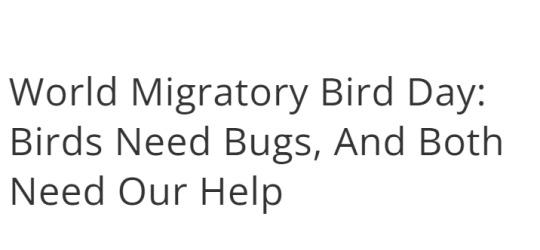
The interconnectedness of insects and birds is at the core of this year’s World Migratory Bird Day, and the Xerces Society is proud to be a partner with this movement to protect bugs and birds alike. While plenty of non-migratory birds also rely on insects for food, those species that do undertake long journeys every year are especially impacted when bugs are scarce. Whether enough insects are available can determine the timing, duration, and overall success of bird migrations.
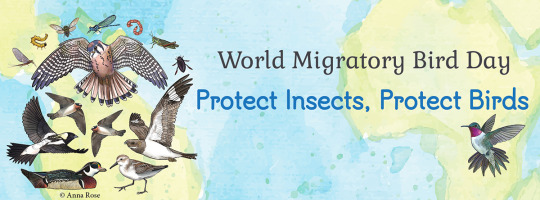
Many birds rely on bugs for food during the most important parts of their lives
Insects, arachnids, and other bugs are a critical part of the diets of many birds. Bugs are full of remarkable nutrients, providing birds with protein-dense, high-energy sources of food. Some birds such as warblers, flycatchers, swallows, and swifts, feed on insects for most of their lives. However, many birds that we might not think of as insect-eaters rely on insects during migration and at other important stages in their lifecycle, in particular for raising their young before they are able to fly.
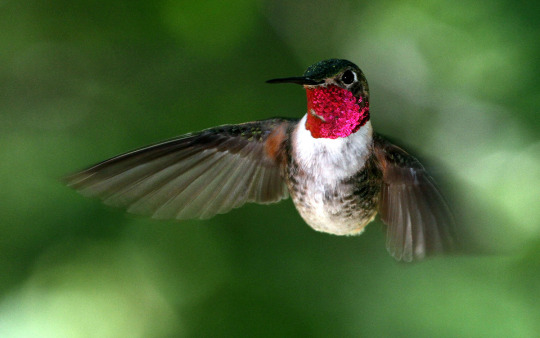
Indeed, many of the birds we regularly see eating seeds from feeders secretly also need insects to survive! Seeds are fine for adult birds that have strong enough beaks to break them open, but baby birds often can’t eat them at all! During the nesting season, parents must catch insects and spiders for their chicks.
Contrary to what many people think, we often underestimate how much birds of prey rely on insects for their diet. The American kestrel (Falco sparverius) is a species found all over the world and loves soaring over fields to snatch insects from the air. It captures the big ones like grasshoppers, cicadas, beetles, dragonflies, butterflies and moths.
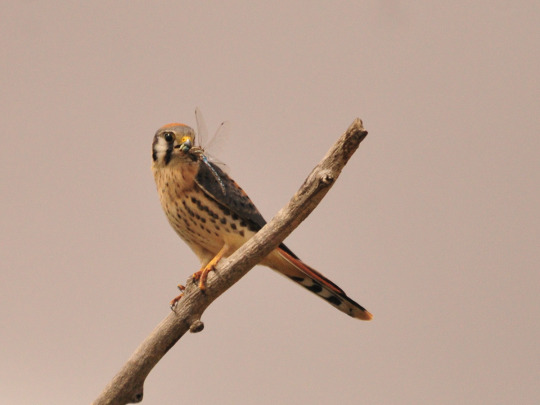
Bird and bugs are facing the same threats
Where natural spaces, such as forests or grasslands, are transformed or destroyed by activities such as intensive agriculture or urban development, insect populations drop, often dramatically. Damage to a few key habitats can create a negative cascading effect that results in severe bird population declines, across the many species that share a migration route.
Likewise, pesticides often have dangerous consequence for wildlife. Many pesticides affect many different species, apart from their intended target. This can be either directly (by killing them) or indirectly (for example by polluting water bodies and affecting water invertebrates’ development). The use of chemicals in agricultural fields can dramatically decrease the population of kestrels and other birds that would otherwise control insect populations. And in our yards, pesticides can impact species like hummingbirds, and the insects they depend on for survival.
Together we can take action for birds and bugs
Why are we at Xerces so happy for birds to eat plenty of our favorite insects? While it can be sad or uncomfortable to see a bug you like get eaten, that interaction is also a part of nature. A healthy ecosystem can support enough bugs that while some are eaten by birds, plenty others survive and reproduce. Birds also help control the populations of the few insect species that can be problems for humans, such as mosquitoes and insects that can damage crops.
And many of the strange and wonderful things about bugs, such as the bold colors of monarch butterflies, the incredible jumps of grasshoppers, or the fascinating mass emergence of cicadas, have been shaped by evolving in response to predators like birds. They wouldn't be the bugs we know and love without that evolutionary history.
Every action we take to save insects from pesticides, or to conserve nesting habitat for birds, helps the other. Together, bird watchers and bug fans can make a healthier world for everyone.
Here are ways you can stand up for these animals:
Learn more about World Migratory Bird Day, and join an in-person or virtual event!
Create bug-friendly habitat around your home, and organize with other passionate people to protect larger areas from development and unregulated industry!
Use alternatives to pesticides, and support food growers that are committed to reducing pesticide use!
Protect nocturnal bugs, and birds migrating at night, from light pollution!
Get involved in community science efforts to help monitor at-risk species!
#world migratory bird day#conservationists#wmbd#migratory birds#protege los insectos#insects#Protect Insects Protect Birds#11 May
0 notes
Text
very annoyed today at discussions of Sackett v EPA that DON'T discuss the constitutional avoidance reasons for the statutory interpretation of wetlands and their adjacencies
perhaps unsurprisingly, i don't think that the views of 'scientists' or 'the general public' are relevant as to construing the scope of the ability of the federal gov't to regulate usage of private property in a domain traditionally left to the states!
#i will allow myself to be satisfied that nobody still defends that 'whereever a migratory bird may land the jurisdiction of the#Clean Water Act shall extend'#granted i don't think Alito can write his way out of a paper bag so i'm happy to blame him for the confusion#i don't think i'd limit myself completely to Thomas' opinion not having read it but he has the right idea!
0 notes
Text
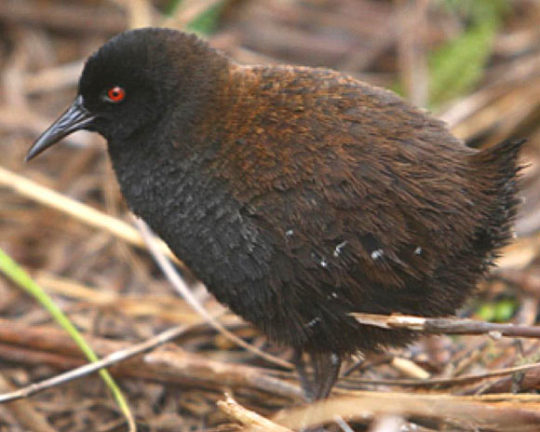
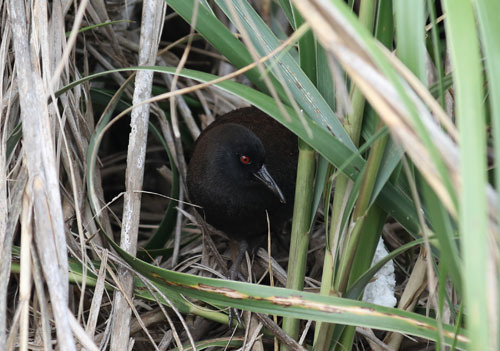
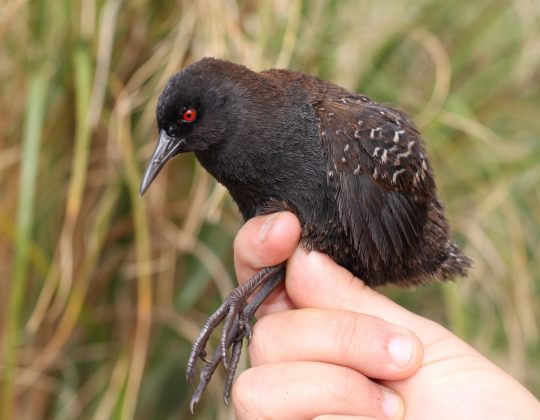
Access Denied: The Inaccessible Island Rail
The Inaccessible Island rail (Laterallus rogersi) is a rarely seen member of the rail family, Rallidae. Part of the reason for its obscurity is the place in which it resides: Inaccessible Island, part of the Tristan da Cunha archipelago in the southern Atlantic Ocean. These islands are extremely remote, and until 2019 it was unclear how L. rogersi even came to be there. We now know that the species colonized the island some 1.5 million years ago, originally coming in from South America and subsequently losing its ability to fly.
In addition to its unique evolutionary history, the Inaccessible Island rail's greatest claim is that it is the smallest flightless bird in the world. Individuals weigh between 35 to 49 g (1.2–1.7 oz) and can be 13 to 15.5 cm (5.1–6.1 in) long from beak to tail. Members of both sexes are dark brown with red eyes; some may have white striping along the underbelly or wings. Females tend to be slightly smaller and lighter in color than males.
The Inaccesible Island rail can be found on all habitats on the island in which it inhabits; these include low mountains and fern brush though the species is most abundant in the grasslands that grow close to the rocky shore. Within these habitats, L. rogersi is largely diurnal. They freely forage for invertebrates, including earthworms, beetles, and moths, as well as seeds and berries; as they have no natural predators they have few defenses against potential threats, although they can run extremely fast when alarmed.
Adults are highly territorial, and when two rivals of either sex encounter each other they will display by lowering their heads, circling each other, and calling loudly until one of them concedes. Males and females mate for life, and build nests in the tall grass. The breeding season is between October and January, in late summer, and females lay a clutch of 2 eggs. Both parents take turns incubating the eggs until they hatch. Chicks can be vulnerable to predation by the migratory brown skua, so parents guard the nest fiercely. The time it takes for chicks to fully mature is unknown, as is the average lifespan in the wild.
Conservation status: The Inaccessible Island rail is considered Vulnerable by the IUCN. The island's population is believed to stand at about 5,600 adult birds. While the island's ecology is currently stable, researchers believe the species would be seriously imperaled if invasive species such as house mice, feral cats and brown rats were introduced. Access to the island is currently restricted, and the island has been declared a nature reserve by the Tristan da Cunha Island Council.
If you like what I do, consider leaving a tip or buying me a kofi!
Photos
Peter G. Ryan
#inaccessible island rail#Gruiformes#Rallidae#rails#birds#islands#island birds#grasslands#grassland birds#Atlantic ocean#animal facts#biology#zoology
944 notes
·
View notes
Text
It's October and I want to talk about something creepy, so this Wet Beast Wednesday is about the lancetfish. These things look like what would happen if a fish became a vampire. Lancetfish are the only members of their family, Alepisauridae and consist of two species: The longnose lancetfish Apleisaurus ferox and the shortnose lancetfish Apleisaurus brevirostris. While they are often caught as bycatch, there is still a lot we don't know about them.
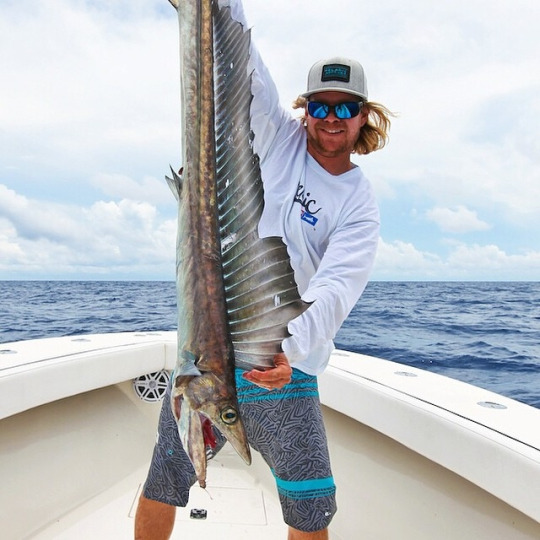
(image: a lancetfish held by an angler. Its body is long, skinny, and silvery. Its dorsal fin extends down most of its back and is supported by a series of long, thin spines. Its head is pointed and the moth is very wide. It has a large, green eye. The tail is out of frame)
Lancetfish are long and skinny fish capable of reaching up to 2.08 meters (6.8 ft). Their dorsal fins are especially notable, stretching down most of their backs and being spiny, resulting in one common name for them being the "handsaw fish". The fin likely gives stability when the fish swims fast and can fold down. The fin is situated in a groove so when it folds down, the top of the fish is smooth and reduces drag. Lancetfish are also one of the relatively few fish to have an adipose fin. The mouth is large and opens very wide. It has long, skinny teeth that point backwards and are adapted to hold onto struggling prey. Their bodies have no scales, only smooth skin with pores for the lateral line. The name "Alepisaurus" means "scaleless lizard", a reference to their body shape and lack of scales. The stomach can expand to hold a very large volume. Lancetfish lack swim bladders and are simultaneous hermaphrodites, posessing male and female gonads at the same time. They show some anatomical differences from other hermaphroditic fish, including testicles that are independent from the ovaries.
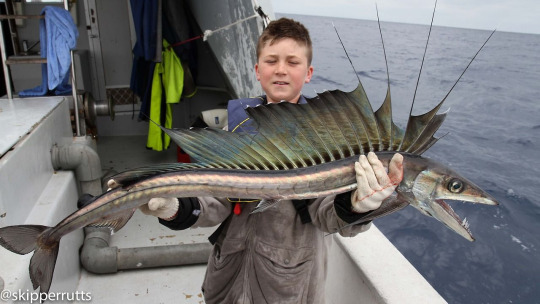
(image: a lancetfish held by a child on a boat. More detain can be seen on the dorsal fin, which includes four spines that grow long past the webbing. The tail ends in a forked fin.
Lancetfish are found worldwide except for arctic regions and are more common in temperate to tropical waters, but have been found as far north as Greenland. They are found in the mesopelagic (twilight) and bathypelagic (midnight) zones, but sometimes swim closer to the surface and can be found at a huge variety of depths. They are unusually large for fish that live in those areas. They are generally believed to be solitary, but may gather together to mate. They may also be migratory, as they have been reported seasonally appearing and disappearing in some locations. Lancetfish do also travel to colder waters if food is scarce. They are predators with extremely wide diets that include fish, cephalopods, tunicates, and crustaceans. They are also notoriously cannibalistic, as lancetfish show up in the stomachs of other lancetfish very frequently. There have even beec cases of scientists finding a lancetfish inside of a lancetfish inside of a lancetfish. They are so well known for cannibalism that they are often named "cannibal fish". Lancetfish are likely ambush predators. Their muscles are gelatinous, which is unsuitable for chases but does work for sudden bursts of speed. They most likely hang motionless in the water, waiting for prey to pass. How lancetfish reproduce is unknown, but they are probably broadcast spawners.

(image: a lancetfish in its natural habitat. It is suspended vertically in the water, with the head pointing up. Its dorsal fin is folded back)
One interesting feature of lancetfish is how slow their digestion is. Lancetfish are often found with undigested or partially digested food in their stomachs. One hypothesis is that They digest food slowly wile living a low-energy lifestyle to make the energy gained from each meal last as long as possible. Another is that the stomach acts like storage and will only begin digestion if the fish is low on energy. This provides an interesting avenue of research. Lancetfish caught as bycatch or that was up on beaches can be dissected to investigate their stomach contents, which are so much more pristine than those of other species. This means each lancetfish acts as a net, containing tons of specimens that give us a good (if biased) look at the bathypelagic food web and local biodiversity. Scientists are starting to find a lot of plastic in lancetfish stomachs. It is hypothesized that some of this plastic may be ingested by prey who practice daily vertical migration bringing tiny pieces of plastic down into deeper waters where they are ingested by larger predators. Some plastic pieces found may be too large to be explained by this method alone, such as a fragment of a black plastic bag around the same size as a hand towel found in one lancetfish. This is part of growing evidence that shows plastic pollution is not just a problem for the surface as was previously though, but exists throughout the water column.
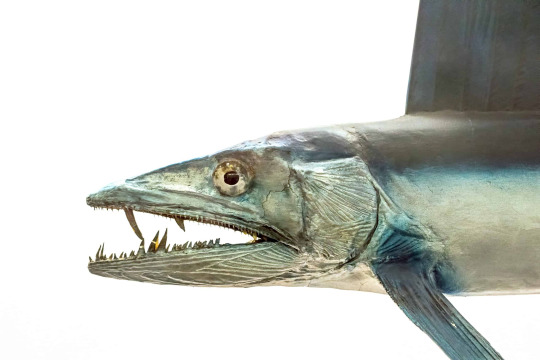
I told you, its a vampire fish (image: a close-up of a lancetfish head. Its mouth is open, showing the teeth. They are long, skinny, and sharp. Most are short, but a few on the top and bottom are much larger than the others)
Lancetfish are not commercially caught as there is no market for them. Their gelatinous meat is considered unappetizing, though it is also said to taste sweet. They are considered pests in longline fishing industries for taking bait intended for other species. The amount of lancetfish bycatch is increasing, possibly indicating population growth due to overfishing of their competition and prey. Known predators of lancetfish include tuna, cod, opah, salmon sharks, and sea lions. Because of how deep they live, not much is known about any conservation needs
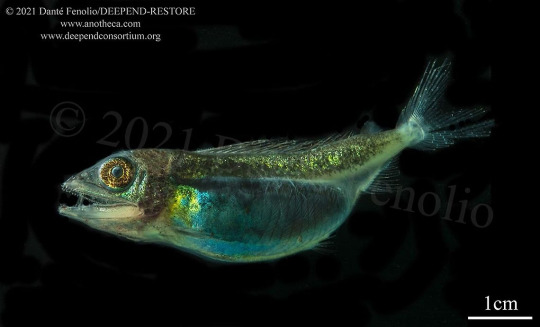
(image: a juvenile lancetfih. Its body is green and translucent and much shorter than that of the adult. The head has the same shape as the adult. The dorsal fin is much smaller and less distinct. The body is curved at the spine and the internal organs are visible through the skin)
#wet beast wednesday#lancetfish#lancet fish#fish#fishblr#marine biology#biology#zoology#ecology#animal facts#pictures#long boi
642 notes
·
View notes
Text
The Walled World consists of the U.S. and Canada (in North America); Japan and South Korea, plus Australia and New Zealand (in the Asia-Pacific region); plus basically the entire European Union (2); and also Israel. In 2009, that club of nations represented just 14 percent of the world’s population but earned 73 percent of its income. Conversely, the “gray areas” outside the walls were home to 86 percent of humanity, who scraped together just 27 percent of the world’s income.
The average monthly income inside the wall is around €2,500. Outside, it’s just €150. Money may or may not buy happiness, but it does buy quality of life. The yellow dots, which represent the world’s top 50 cities in terms of quality of life, are almost all inside the wall — only Singapore is outside, and that relatively wealthy city-state should arguably be included inside the wall anyway.
In other words: the poor are many, the rich are few. That’s not a new phenomenon of course, nor are the migratory pressures it causes. That’s where those barriers come in. The map lists some examples, the locations and the circumstances of which are all different — but which are all pieces of the same puzzle shown on this map.
560 notes
·
View notes
Text
The gameplay loop of Eat God follows the basic Bugs Bunny model: the player characters show up in a community that's suffering under some abuse of authority, decide to stick their noses into the situation – you don't make "eating God" your life's aspiration unless you've got some pretty serious issues with authority! – and spend the length of the session causing problems on purpose which may or may not address the actual situation, but which definitely ensure the authority figure(s) in question are having a bad time.
This setup makes a couple of demands of the implicit milieu. Firstly, most of its inhabitants need to be basically human. The inhabitants of a given community might have pointy ears or anthropomorphic animal features or mushrooms growing out of their heads or whatever, but there's a norm in place that's within spitting distance of the human form. The player characters, conversely, are a bunch of little muppety critters who, like Bugs Bunny, are regarded by society at large as clever vermin in spite of demonstrably being just as much people as anybody else. Unfortunately for the folks in charge, these particular clever vermin have bullshit super powers.
The flip side of that equation, however, is that if the setting's inhabitants need to be basically human, then in order to fulfill the game's implicit Fritz-Leiber-meets-The-Muppet-Show promise, the setting itself needs to be weird as hell. Maybe one session takes place in a migratory village built on the back of an enormous living creature, and the next sees the player characters party-crashing a clockwork castle orbiting a black hole. How did they get from the former to the latter? It literally doesn't matter – a wrong turn at Albuquerque, maybe.
The trick is, it's also intended to be a pick-up-and-play game, so it can't require the GM to prep any of that weirdness in advance. All of which is to say that this stupid thing needs so many random lookup tables. You would not believe how many random lookup tables.
1K notes
·
View notes
Text
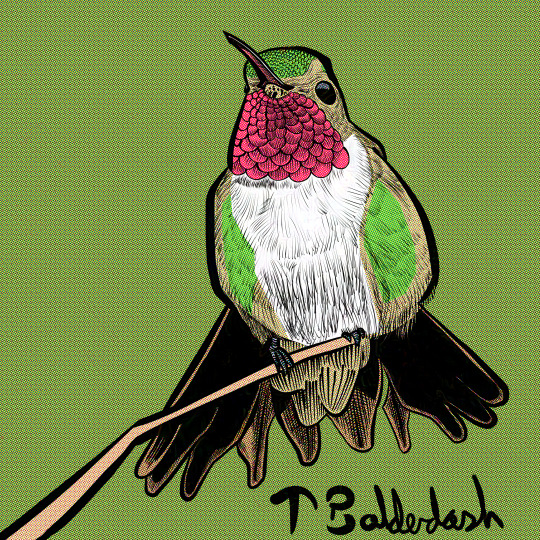
Migratory May day 29: Broad-Tailed Hummingbird
Reference photo by Ted Floyd
#migratory may#broad-tailed hummingbird#hummingbird#hummingbirds#selasphorus platycercus#selasphorus#trochilidae#apodiformes#strisores#bird#birb#birds#birbs#bird art#art#digital art#artists on tumblr#tw eyestrain#cw eyestrain#wauk wauk
163 notes
·
View notes
Text

The Tundra Swan is day 1 of #migratorymay2024 hosted by @migratorymay and @environmentamericas
181 notes
·
View notes
Note
Migratory slash fandom claiming to be "queerbaited" in every single fandom is the fandom equivalent of that guy who says "all my exes are crazy." Dude, you're the common fucking denominator here. Have some self reflection.
Honestly, it sort of worries me the way that shipping fandoms are actively encouraged to be stupid and misinterpretation of text like they are for the sake of a 'representation' that never existed in the show in the first place. Like... These kids are wrapping their entire online presence on denying the text and acting like they are clever and brave for it... It's honestly worrying. Like, I don't deny HOTD's writing, as bad as it, I recognise how the writers frame something even if I don't like it. These people worry me in the way that I would have a student to who I would point some image with the colour blue and they just answer red and then keep arguing me that it is red even when it's clearly not.
Like, shipping is fun but these people are not doing it for fun. They are wrapping their heads into some idea that they are either consuming 'good media' or 'evil media' and the latter is any media that doesn't comply with their idea of 'representation' so therefore they are entitled to feel as victims and cheated by the writers. It's insane. It's an insane way of thinking by people that are just denying that the thing they see as red is actually blue.
I pity whoever taught them English, Jesus.
14 notes
·
View notes
Text
Siren Call: 3
[We’ve had past and present Minerva, but what about future?]
One day, Minerva will be familiar with the island’s crags and shelves. She’ll know the way the shore slope becomes a drop off and where the sandbars are, the color and density of all the coral, the migratory patterns of the species who pass by.
Today, she knows enough to avoid triggering the sensors. Even pauses to adjust one that’s started sagging out of place.
Minerva chooses not to walk up the beach, not wanting to track sand into the - house? Facility? Building? - not wanting to get sand caked to her feet and legs. Jumping straight up to the roof in a waterspout is also unnecessarily dramatic when there isn’t a fight to get to. So she just gathers herself, waits for a wave, and urges it a little higher, placing herself at its apex.
It gets her high enough that she can reach the railing of the overlooking balcony, with enough momentum to curl and tuck her body, cartwheeling over the rail partially just for the joy of motion. Even the smooth tiles feel rough compared to the water, strangely unyielding, and she wobbles just a little as she catches her bearings. Belatedly, she realizes she almost kicked the crap out of one of the balcony’s chairs. The little swerve she does is automatic. At least there wasn’t an audience-
“Minerva.” Says Synovus, sitting on the table because they’re deranged. There’s a surprised tilt to the end of her name, like half a question answering itself. They’re wearing civilian clothes again, and some part of Minerva’s mind can’t help noting that their arms are bare. “Welcome - back.”
One day, Minerva won’t scowl at them on reflex.
Today, she demands immediately, “Were you waiting for me?”
“Y-es?” Synovus hedges, not moving. “But also no? I was - I thought you’d be coming up from the shore.”
They sound almost abashed. But that’s too close to ‘embarrassed’ and Minerva is well aware that Synovus has no shame. She may have genuinely surprised them - they’re perched on the edge of the table, and had leaned away slightly. Synovus wanting to be a problem would have chosen a much more… blatant posture. Or at least to sit further back in the shadows. The absence of either a gaudy attention grabber or deliberate stealth indicated this middle ground was not an act. Or perhaps that’s what she’s meant to think.
One day, Minerva will not have to consciously pick aside the paranoia to see what is in front of her.
Today, it takes effort - but she does it.
With a sigh, she closes her eyes, and focuses on each part of her body, bringing herself down from the mild surge of adrenaline. One hand draws back the wet strands of her hair. The other removes the mask that was a gift. She leaves her eyes closed while she rubs the red marks out of her skin.
With her eyes closed, it’s easier to skip past the defensive retort, and say instead, “You could’ve at least had a coffee waiting for me.”
“I don’t actually know your preferences in that regard.” Synovus admits, and for a heartbeat Minerva is worried this will turn into a far too blunt conversation about homecomings, but - “Do you take it black? Iced? Green?”
Minerva scoffs, but it might have just been a laugh. Even she’s not sure. “White chocolate mocha.” She answers. “One shot espresso, oat milk.”
“Ah,” Synovus says, as Minerva opens her eyes. They seem to have had a revelation. “So that’s why Alexandria likes those Unicorn frappes so much. Hm. And here I usually go for the cider.”
A smile tugs at one corner of her mouth at the thought - Synovus, dread assassin, going to a coffee shop and ordering hot apple juice with whipped cream.
Minerva sets her mask on the table. “Stand up a minute.” She tells Synovus quietly, her voice nearly lost in the sound of the waves below.
“I don’t take direction well.” Synovus replies, even as they slide off the table and to their feet, turning to face her. There’s a caution to their movements, but also curiosity, written far more liberally across the unobscured face Minerva once never thought to see.
If Minerva meets their eyes too long, she’ll lose her nerve, so she winds up staring somewhere around Synovus’s collarbone instead. There’s a scar there, hidden for now by a high-necked top, and Minerva knows that because she put it there. It had been a targeted move: Synovus had broken her collarbone the fight before.
She wants to be better at giving back things other than pain.
“Just - give me a moment. Don’t move, please.” She’s pretty sure it’s the ‘please’ that gets them. Synovus goes so statue-still that Minerva’s not sure they’re blinking. But they don’t protest. And they certainly don’t move as Minerva steps forward.
And in one of the most awkward movements of her life, slides her arms around Synovus’s ribcage, setting her chin gently on their shoulder.
This is instantly easier when she no longer has to look at Synovus’s face. Well. When she can’t look. Can’t fixate on finding and parsing the smallest of expressions, assigning meaning to the specific tilt of a chin or speed of a blink. She’s still bad at it - hugging - because she usually just lets other people hug her, and initiating it is weird, but she can’t imagine Synovus is particularly good at it either.
After all, they’re still standing stock-still, and if Minerva wasn’t currently very aware of their breathing, she might even think they were panicking.
“Not a trap.” She mutters, and feels as much as hears Synovus’s responding huff. But their arms slowly, cautiously, hesitantly come up to return the embrace, hands resting lightly on her back. The side of Synovus’s head tips gently into hers.
One day, Minerva might not feel awkward about body contact and physical affection. One day, she may find herself as familiar with Synovus’s scars as she is her own. And she just might reach a point, eventually, where one of them could make a joke about this just being an excuse to get Synovus wet and not immediately both perish from the agony of an accidental allusion to arousal.
For today, this awkward embrace is enough.
———————————————————
Minerva probably won’t ever see a crowd as something other than a threat to be monitored.
Large groups have always made her tense, and that instinct had only gotten worse over the years. Most villains respect the ad hoc agreement about making an entrance, but there are a distinct few who would kill from a crowd. And there are those who are not villains in the distinct, identity sense, but would wreak havoc nonetheless.
So she scans the mall’s sheltered internal colonnade from behind her sunglasses, and listens to her daughter tell her about her day.
“- I just told him that I’d come from further South, and he didn’t ask me any more questions after that, but then freaking Brad asked me if I was an ‘illegal’ and I know what you mean now, about temptation to cram people into lockers. He’s lucky he’s so tall; I couldn’t fold him up to fit without taking some limbs off.”
Alexandria huffs, taking an aggressive pull from her milkshake. The stress of her life is getting to her - no teenager should have worry lines, or bags under their eyes that deep - but she insists this is what she wants. Even if Minerva sometimes wonders whether Alexandria sees herself as a member of the school’s attendees, or just a spectator who sometimes catches a stray ball.
“Did you tell Brad that?” Minerva asks mildly, mostly curious.
Alexandria sighs again, “No.” She says sullenly, shoulders slumping. “I asked him if he thought the government should determine who gets to live where, and then when he started to argue with me I told him I hoped his yacht sank with him on it.”
“Alexandria.” Minerva was still learning to find the right tone. The right amount of reproach, without exasperation or accusation. She must’ve gotten close, because Alexandria just lifts one hand in a ‘not me’ gesture.
“Specifically so he’d wash up in Mexico or Hawaii and get to be illegal himself.” She clarifies. “I don’t think that convinced anyone I wasn’t an immigrant, though. Til Seanna pointed out my grades in Spanish would probably be better.”
Minerva’s sigh is more restrained, but she points out, “There are other languages in South America. Brazilian Portuguese, for example.”
She’s not sure why she’s entertaining this, really.
“That’s true.” Alexandria ponders that for a moment, drinking more of her milkshake. “I mostly just meant to imply I was from one of the towns that got fu- uhhhh, screwed up by the power grabs.”
Minerva briefly leaves the conversation, remembering that shell of a place. The layouts, the dressings of a town, not quite abandoned yet but with nothing else to bleed.
Judging by the nudge she receives under the table, Alexandria isn’t totally oblivious to her distraction. She’s also changed the subject.
“So.” Alexandria is saying, drawing one syllable into three, “How are you and my godparent getting along?”
‘Godparent’ has become Alexandria’s favored way of referring to Synovus in public. It’s a joke on multiple levels, some of which Synovus seems to appreciate. But Minerva thinks it also makes them slightly uncomfortable, in a way they refuse to express to Alexandria.
“It’s fine.” Minerva replies, on rote. Her eyes flick to Alexandria, then back to the crowds. “What is it?”
“What do you mean, ‘what is it,’?”
“You wouldn’t have asked if you didn’t want something in particular.”
Alexandria’s mouth twists down, “Can I just get an answer without fishing for it, for once?”
Startled, Minerva looks at her again. Takes a better assessment of her daughter’s body language, the tension there. She knows she’s also gone tense.
Anger creeps into Alexandria’s voice, replacing the annoyance. “I’m not going to lose control. I’m not-“
She cuts herself off, abruptly looking away. Her fingers relax around the plastic cup, deliberately demonstrating that her strength won’t get away from her.
Minerva has a suspicion of how that sentence might have ended. I’m not like you and dad.
Reaching out physically feels like the wrong move here. So does stiffening up further and refusing to talk about it. Be better, she thinks to herself desperately, her mind flicking back to an image of a person with one foot in the water, one on dry land.
“We still… disagree, on some things. Some major things.” Minerva makes herself say. She still doesn’t like that Synovus kills people. She doesn’t like that Synovus has ostensibly killed for her, or for Alexandria. But she also feels relief that Synovus did, and a sense of gratitude she can’t quite smother. It makes her feel dirty, oily, and she hasn’t found it’s root.
Taking a breath, Minerva continues, “But… I don’t think they mean either of us harm.”
Alexandria has relaxed a little, absorbed by what Minerva’s saying. And probably having to pick through it for what she isn’t saying either.
“Would you say that you, I don’t know, maybe, trust them?” Alexandria prompts.
Minerva’s grimace is answer enough.
Alexandria sighs, “Mom.”
“It’s complicated, Alexandria.” She says, but it’s not the abrupt conversation-closer it would have once been. More… beseeching.
“Do you trust anyone?” Alexandria asks, “And like, I don’t even really mean me, here, but like. Anyone?”
Minerva remains silent.
“Do you trust yourself?” Alexandria asks, sounding a little alarmed.
Minerva hesitates - but she can’t really answer that one either.
They sit in silence for a few minutes, just the background roar of the mall’s crowds between them. Minerva hates this. She hates feeling like she can’t actually control herself, can’t master the emotional impulses she’s forcibly crammed into a box for years. She hates that Alexandria is having to pick up the conversation, make the overtures, do the work.
But any time she tries to think of a way to do it herself, her mind shies away from it. The words wilt and die in her throat. Because what if she gets it wrong?
What if she has more to lose?
Eventually, Alexandria looks at the melted remnants of her milkshake, and asks, “Can we stop at the Hot Topic before we leave.”
One day.
———————————
A week later, Rosie pokes her head into the common room Minerva’s reading in. “Minerva?”
She’d finally been asked point blank by one of them what she wanted to be called, because Athena no longer seemed accurate. Committing to Naiad hadn’t felt right either, so she’d given up her civilian name. Synovus already knew it, what was the point?
(It had occurred to her, later, that the small thrill she felt at being addressed by it was possibly what Alexandria felt at being addressed by her chosen name.)
(Also, it would’ve made Albion furious.)
“What is it?” Minerva asks now, letting one finger hold her place in the book as she sits up.
“There’s a fight drifting our way - Zephyr and a few others against the Eye. He’s made another floating platform again.” Rosie rolled her eyes, providing her professional opinion.
Minerva tilted her head, hesitating. Zephyr was a hero she’d worked with before, though they had never gotten along. He’d offered to take her flying, she’d taken that as flirting and shut it down, they’d never really overcome the resulting awkwardness. She had no idea who he’d be working with.
Eye, in contrast, was Eye in the Sky - a villain obsessed mostly with surveillance, and not being observed himself. He was a center point of several conspiracy theories involving the NRA, CIA, and a number of international organizations. She’d never fought him before, just heard the stories.
“What’s the protocol?” Minerva asks, rather than offer any of that information. She was certain this group of people knew far more about everyone involved anyway.
Rosie smiles, “Not much of one, just a lower alert status. Doll and I will make the rounds and check on everyone, Synovus is going to suit up just in case, but we won’t get involved unless territory agreements are breached.” She added, “Alexandria’s still on the mainland, we’ve made sure she knows to be suited if she makes her own way home.”
Minerva taps at the cover of her book, thinking. She feels adrift, still. This isn’t an actual fight, unless she wants to go and be Athena, and the idea of that is physically uncomfortable. It would also invite too many questions. Naiad would-
Hm. “Does Synovus want me in uniform?” She asks, sardonic.
“I didn’t ask and don’t plan to.” Rosie replies flippantly. “If they want you to do something, I imagine you’ll hear about it directly.”
Somehow, that isn’t the response she wants. “I don’t-“
“They also haven’t given any orders that you’re to be stopped.” Rosie points out, cutting her off. “The rest of us will be either in the operations room or up on the roof to watch. Klaxon if there’s trouble.”
She gave Minerva another smile, twiddled her fingers, and withdrew. Minerva shifted, and opened her book again.
She made it through two more paragraphs, then left it unceremoniously on the floor.
———————————-
On the roof, Synovus was pacing.
In a way, that’s reassuring, because even Minerva knew by now that if there was imminent danger, Synovus would be stock-still. The sun glints off the dark helmet, and threw the matte black of the rest of the suit into stark relief against the sandy-colored rooftop. Wind off the sea ripples through the cape, keeping it blown back, perpendicular to the path Synovus is walking.
The sun is kinder to Minerva’s costume, and there is no cape to blow. The dark mask helps keep her from being blinded by the sun. Athena wouldn’t be of much use here; Naiad might be.
Doll - the larger, Russian man who Minerva thought of as Synovus’s second in command - stood up here too, a viewfinder raised to cover his face. He’s looking into the direction of the wind, angled out and up, and Minerva follows that direction.
There it is - flashes of distant, shimmering silver in a cloud bank that’s thinning. Some masking device, most likely, now disabled. There’s tiny flashes of what must be powers or weaponry at use, but she can’t make out more than that.
“How bad is it?” She asks anyway, brisk and businesslike.
“The wind isn’t in our favor.” Doll comments. He’s always answered her as if she’s a coworker, and she appreciates that. “I can’t tell how much of it is powered and how much of it drifts. If there’s been damage to it -“ He lowers the viewfinder to make a hand gesture. “It might not be able to control its direction anymore.”
“Sloppy.” The comment is out of Minerva’s mouth before she can stop it. It draws Doll’s attention, if not Synovus’s. At the slightly raised eyebrow, she sighs and continues, “Disabling propulsion or navigation creates unnecessary risk to everyone involved. The only time it becomes necessary is when there’s weaponry that absolutely must be disabled, and you don’t have either the training or the time to sort out different power systems.”
Doll nods, offering her the viewfinder. “It could be self-inflicted,” he points out.
“Possible, but suicidal. That would require an exit strategy. Do you think Eye has one?”
“He’ll have three, only two of them will work, and none of them will be enough to keep him from getting captured.” Synovus breaks into the conversation abruptly, annoyed. Or perhaps professionally offended. “They’ll be personal craft.”
Meaning the rest of the platform’s crew would be left to die. Incentive for the heroes to try and rescue them rather than pursue, but what a waste.
The viewfinder lets Minerva get a better sense of the platform’s size, and also an estimate of its height and distance. She can make out a glimpse of a gray-shaded costume, diving through the clouds: Zephyr.
“If you interfere,” She asks, while her view is disconnected from her surroundings, “What would that look like?”
There’s a hesitation. A gust of wind snaps at Synovus’s cape. The distant battle continues.
“If they cross the boundaries, there must be consequences.” Synovus says reluctantly. “I will destroy the platform. Survivors will become my prisoners. If the heroes protest, I’ll fight them.”
Minerva lowers the viewfinder, and returns it to Doll. Synovus has stopped pacing. “You don’t have the facilities for a mass casualty event.”
“No.” Synovus agrees. “I don’t.”
————————————
Rosie has come out to join them on the roof by the time there’s significant change. The wind has died down some - likely a marker of Zephyr changing it, finally reaching their shores. The air feels thick and dead without it.
They’ve mostly stood in silence, watching. It feels longer than it has been, and Minerva knows it’ll be worse for those actually fighting. She’s surprised she hasn’t felt more of an urge to intervene.
Though she has been keeping watch for anyone falling to the water below.
It’s hard to say which of them notices first - their attention is collectively on the sky platform, and not each other. But there’s a decided tilt to the mostly-exposed metal monstrosity now, and in very short order, it begins to fall.
“Catch it.” Minerva finds herself murmuring. “Catch it. At least slow it-“
But no one does.
The platform hits the water at the full speed gained from a several thousand foot drop, slamming into the ocean. Those watching know that the metal will crumple on impact, water at that height and velocity worse than slamming into concrete. The surface area only makes it worse; tilted in at a slight angle, it displaces the water in a specific direction.
Towards the island.
Minerva had studied the ocean as much as she could. She knows this phenomena, and can cite times in the past it’s occurred. Not caused by the shifting of the ocean floor or tectonic plates, but by a sudden mass displacement.
They call it a super-tsunami.
Synovus is a statue beside her from the moment the platform starts to fall. Doll catches on once the surface of the water rises - and then doesn’t fall again.
“Three minutes.” Minerva calculates, based on distance and the probable speed of the wave. As many miles to cross. Much taller. “Evacuation?”
“The Jet is under repair, we can’t get it into the air in time.” Rosie answers, grim.
“Seals on the inner portions of the facility might hold, but we don’t know how long we’d be underwater.” Doll says, hitting the klaxon anyway. “The fridges?”
“Only as good as long as the power lasts.” Rosie replies. “Alexandria?”
“Still on the mainland.” Doll growls, running a hand through his hair. “Even if she could reach us in time, we’d have to get everyone onto the plane-“
Synovus has, so far, said nothing. Minerva is the only one close enough to catch when they choke out a strangled, “-fucking submarine -“
Minerva had expected Synovus to have a plan. A power, a strength, a defense mechanism. The realization that they don’t is like a fire’s been lit at the base of her spine.
She doesn’t remember grabbing Synovus’s collar, or dragging them to face her. She does remember saying, “I can stop it.”
Synovus doesn’t hesitate. “What do you need?”
There is no questioning of if she’s sure, or recommendation that she go into the waves to ride it out. No suggestion of running.
“Get me in front of it.”
Immediately, Synovus has one arm under her knees, the other around her shoulders, and they’re running. Off the edge of the roof, not quite flying, flickers of shadow beneath their feet. Minerva doesn’t have time to question it, because her attention is on the big damn wave.
When she had said she could stop it, she had spoken with a bone-deep certainty. But she’d never actually tried to divert a tsunami before, let alone one of this size. The largest amount of water she’s worked with has always been as much as she needs to accomplish her goal, and nothing more. Diverting some rain-induced flooding is nothing compared to the power of the tides.
But she can feel the ocean beneath them, as Synovus clears the island’s coast. She can sense the oncoming wave, so fast to them, but to the ocean like a flinch in slow motion. The ocean doesn’t know how to control a fall.
But Minerva does.
The trick is in grasping the majority of the wave without over extending. She doesn’t need every droplet, every molecule, but she does need the vast majority of them.
It’s like trying to get a grip on something flat with only the pads of her fingers. It’s like misjudging a stair and finding herself both plummeting and ramming into an outside force. It’s like taking the first breath of rain-rich air in the early morning, and feeling life enter her lungs again.
Minerva twists the top back over itself, breaking the wave in the wrong direction. She cuts it down the middle, diverting it off to the sides. She forbids it to go forward, as though it’s met a cliff. And as the water falls, the wave collapsing, so does she.
It takes a brief second to put together that the body that had been holding her aloft is now limp, twisted slightly as though to put itself between her and the wave. Synovus is unresponsive, the shadows gone, only the cape whipping around them as they fall. Minerva is able to catch them, now, grabbing on before they can drift away.
She reaches for the water below them, calling it up to catch them with less than bone-breaking force. It’s easier, somehow, but also harder, and she’s having trouble fixing a direction in her mind for where the wave was and where the shore should be. Hot air, harsh wind, cool water and the dimming depths as they’re both drawn down.
And she remembers, finally, that Synovus can’t swim.
—————
The disorientation has mostly worn off by the time Synovus wakes up.
Minerva had managed to follow the upset currents, but hadn’t wanted to risk trying to shape and change them. Or to fight them overmuch, with her cargo. So they’d wound up washed not to shore, but to a small opening into one of the partial lava tubes at the island’s base.
Outside, saltwater rain is still falling, though it will stop soon. The ocean’s roar sounds, to her ears, slightly confused. The sun is still shining, and the wind has picked up again. ‘Calm’ is a subjective definition, but they’re approaching it.
Minerva had been relieved to find that Synovus’s helmet was intact, even with the impact to the water. She’d managed to find its clasps, and to remove it, making sure the seals had also held and that Synovus wasn’t drowning in their own personal fishbowl. They’re propped up against her legs, which are folded beneath her, and she’s prepared for a violent awakening.
But Synovus’s eyes blink open, and Minerva is able to watch their facial muscles work as they come to terms with their surroundings.
“You fainted.” Minerva informs them.
Synovus squints at her, but doesn’t immediately protest. They also don’t try to move much, other than a slight squirm that Minerva recognizes as a full body check. Do I still have my appendages? Do my fingers and toes all work?
“Yeah.” Synovus concedes. Their voice is raspy with saltwater, even though they didn’t get much of a chance to drown. This time.
Minerva should probably start somewhere else - like making certain they’re okay, or assuring them about the conditions outside, that the wave had been averted. Instead, she all but demands, “If you’re so terrified of water, why in the hells did you build on an island?”
She can see the balk in Synovus’s expression: a furrowing of their brow, a twitch of the nose. Synovus lifts a hand to consider covering their face, eyes the sand on their glove, and lowers it again.
“I already know you can’t swim.” Minerva says flatly.
“I can swim.” Synovus shoots back, annoyed. “I cannot swim well, there’s a difference.”
They sigh, and move to sit up. Minerva doesn’t stop them. She doesn’t expect an answer, at least not without further prompting, but Synovus continues:
“It’s… easier. The isolation. Clearly defined borders. This is mine, everyone else fuck off. And it…” Synovus shakes their head. “It serves its purpose.”
Once, Minerva would’ve accused them of grandstanding. Of the island being a show of wealth and status. She knows better now - knows that while that is true, there’s other reasons, layered beneath.
And she thinks about everything Synovus has ever told her about self control.
“It contains you.”
Synovus hesitates, partially grimacing, but nods. “Serves its purpose.” They repeat quietly.
The two of them sit in silence, in the dark shadow of the cave. They listen to the water, and the waves as they return to normal.
“Thank you.” Synovus says, into the silence.
“I don’t require thanks.”
“But I feel you deserve it, and it’s mine to give.”
“And if I don’t want it?”
“Refuse it. I will survive the disappointment.”
Minerva has the uncomfortable feeling that they are not discussing only gratitude. Rather than address that, or continue the discussion, she says instead: “I don’t know what I believe anymore.”
Synovus doesn’t reply. They tilt their head, studying her in the dark. Minerva’s dragged them into a cave and confronted them with truths after they passed out from fear doing something on her word, she should give them a break. She doesn’t.
“I should be out there looking for survivors, or recovering the dead. I don’t want to. I should’ve involved myself in the fight, reminded them to be careful of the platform’s vulnerabilities. I didn’t. I don’t feel guilt. I feel… annoyed. Angry. Because they should’ve known better.”
Synovus just turns a bit, to rest their back against a rock. “And that in turn makes you feel..?”
“Foolish. Arrogant. A bad hero, and a worse teacher. I should be patient. Forgiving.”
“They nearly killed you.” Synovus points out dryly. “You’re allowed to be angry about that.”
“And more would’ve died if the wave had reached the coast.” Minerva grits her teeth. “But that anger should be - I can’t control them. I cannot fix them. But I didn’t even try to intervene until it was almost too late.”
“But you did intervene.”
Minerva gestures, attempts to pinpoint the logic fruitless and frustrated. “Am I a hero or not?” She demands. “Do I act for others or only my own skin? I’ve spent years - decades - so sure of the answer but now -“
She raises her hands, half-fisting them in her hair. The sensation provides a little bit of grounding, enough of a distraction she doesn’t think about the words before she says them. “- now you make sense to me, and the things I thought I believed in enough to die for are - are hollow or gone or dead. And I let you kill them. I let you kill him.”
Abruptly, she draws her knees up, burying her face in them. “I let - I made - my child - our child -“
Minerva can’t tell if she’s crying or not. Her breath is coming in gasps, and her face feels hot, and this was always the part of weeping that she hated the most; the lack of control, the inability to communicate. Her eyes burn. So does the center of her chest, her stomach.
And Synovus is here, as her witness. Why not? They’ve seen every other ugly part of her, every other failure. She’s spent a good portion of her adult life fighting this person, exchanging scars, only for them to pick up the pieces and try to protect her. She’s finally had the upper hand, proven that she does have power, that Synovus now owes her in the brutal calculus of lives, and instead of reassuring her it’s broken her.
Because Synovus doesn’t trust themself either.
But Synovus trusts her.
“Do you wish I wouldn’t have killed Albion?” Synovus asks quietly.
The answer is as simple and certain as the water. “No.” She says honestly. “No I - I don’t.”
There’s a pause. Then, “Do you wish I would’ve killed you too?”
That answer isn’t as clear to find. “I - some days.” She says hoarsely. “I committed the same crimes.”
Synovus exhales, across from her, and it isn’t quite a sigh. “Alexandria feels differently.”
Minerva stops breathing.
Of all the answers Synovus could’ve given, that’s the one she can’t counter. She can’t afford to do this. To wallow in self recrimination. Her daughter is out there. And while maybe - maybe her morals are falling to pieces, and she doesn’t know who she is, but she knows that whoever she is loves Alexandria.
“Is it pathetic?” She asks Synovus, in the dark she can’t see through and Synovus can. “To need someone else to determine who I am. What I believe.”
She can hear the twist in Synovus’s expression as they reply, “That’s… inherently not a question I can answer. But, Minerva?” Synovus doesn’t hesitate, so much as pick their way across uncertain footing, “I don’t think you would’ve been able to turn back that wave if you weren’t… as much as you are.”
It’s clumsily phrased. Wavering and uncertain. But Minerva, whether because she’s reading what she wants to from it, or because it’s actually Synovus’s intention, understands.
She takes a deep breath. Then another. Then she stands, and offers a hand in Synovus’s general direction. Her voice is much more certain, calm, when she says, “I need to go organize a search party.”
——————
Minerva may not ever come to terms with her role in her ex-husband’s death, or the harm she caused her daughter. She might not ever find the rock-solid beliefs that she once thought she had.
But she might - just might - come to terms with that uncertainty. The ocean doesn’t have roots either.
She’ll have good days and bad days. She’ll need to make decisions about who she wants to become, and how she feels about who she is. But as both Naiad, and Minerva, she has that freedom.
She’ll never touch the Athena costume again.
And one day, while she’s working on a laptop in one of the common rooms, Synovus on one of the other couches and Alexandria sprawled on the floor, Minerva will say, “I have an idea. Something I’d like to do about the Pacific garbage patch.”
And Alexandria will roll over to look at her, and Synovus will glance up. And Minerva will add, “It’s not precisely legal.”
And Synovus will say, “I’m listening.”
——————————
[And so ends Siren Call! This took much longer than it’s other pieces, and there were things I debated including and things I wanted to cut, but in the end, this was the flow the story took. I’m not saying I’m *done* with Synovus and co, but I will say that I’m glad to have this chapter closed and tied off.]
[As per usual, a copy of this will go up on Ao3 soon, and I’ll find out how long it is, because I’ve once again written directly into tumblr drafts. It’s where the Synovus muse lives, apparently.]
#synoverse#synovus#siren call#siren call 3#tw: tsunami#as someone whose stress dreams manifest as dreams about tsunamis#HOO BOY did I not like writing that scene much#but it was what needed to happen#and I’m happy with how it turned out#dont @ me about the physics I will not be studying any more about those damn things#it’s magic I ain’t gotta explain shit
213 notes
·
View notes
Text
A nightingale sang in the London Blitz
When exactly was that certain night, the night Aziraphale and Crowley met — and spoke for the first time in 79 years in the midst of the London Blitz?
And what’s the deal with the nightingale’s song, really?
Grab something to drink and we’ll look for some Clues below.
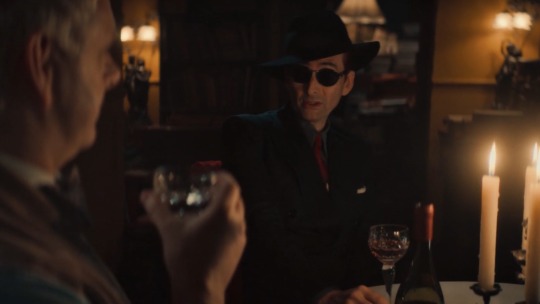
The night they met
The Blitz, short for Blitzkrieg (literally: flash war) was a German aerial bombing campaign on British cities in the WW2, spanning between 7 September 1940 and 10 May 1941. The Luftwaffe attacks were carried out almost non stop, with great intensity meant to force a capitulation and similarly strong impact on British life and culture at the time.
Starting on 7 September 1940, London as the capital city was bombed for nearly 60 consecutive nights. More than one million London houses were destroyed or damaged, and more than 20,000 civilians were killed, half of the total victims of this campaign.
The night of 29 December 1940 saw the most ferocity, becoming what is now known as the Second Great Fire of London. The opening shot of the S2 1941 minisode is a direct reference to recordings of that event, with the miraculously saved St Paul’s Cathedral in the upper left corner.

The actual raid lasted between 06:15 and 09:45 PM, but its aftermath continued for days. The old and dense architecture of this particular part of the city turned into a flaming inferno larger than the Great Fire of 1666. Multiple buildings, including churches, were destroyed in just one night by over 100,000 bombs.
Incendiary bombs fell also on St Dunstan-in-the-East church that night, the real-life location of this scene as intended by Neil. It was gutted and again claimed by fire in one of the last air rides on 10 May, when the bomb destroyed the nave and roof and blew out the stained glass windows. The ruins survived to this day as a memorial park to the Blitz.
Such a delightfully Crowley thing to do: saving a bag of books with a demonic miracle adding to the biggest catastrophe for the publishing and book trade in years. 5 million volumes were lost, multiple bookshops and publishing houses destroyed in the December 29th raid alone.
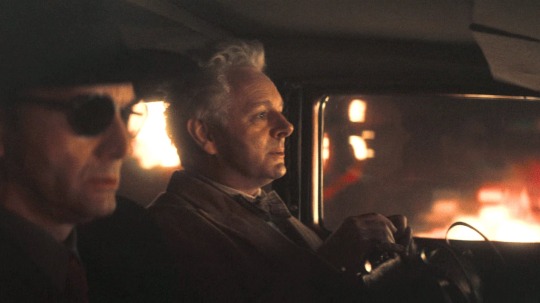
Even without this context, judging by the seemingly unending night, overwhelming cold and darkness, broken heating at the theatre, and seasonal clothing (like Aziraphale and Crowley’s extremely nice winter coats), it’s rather clear that it was the very beginning of the year 1941.
Everything suggests that Aziraphale and Crowley’s Blitz reunion happened exactly 1900 years after their meeting in Rome — which, according to the script book, took place between 1 and 24 January 41 (Crowley was right: emperor Caligula was a mad tyrant and didn't need any additional tempting; there's a reason why he was murdered by his closest advisors, including members of his Praetorian Guard, on 24 January 41).
Interestingly, both events involved a role reversal in their otherwise stable dynamic, with Aziraphale spontaneously taking the lead instead of letting the demon be the one to do all the tempting and saving, and ended with a toast.
The S2 Easter Egg with the nuns of the Chattering Order of St Beryl playing table tennis at the theatre suggests that the Blitz meeting happened on a Tuesday afternoon, which doesn’t match any of the above mentioned days, but sets the in-universe date for 7 January 1941 or later.
The Chattering Order of Saint Beryl is under a vow to emulate Saint Beryl at all times, except on Tuesday afternoons, for half an hour, when the nuns are permitted to shut up, and, if they wish, to play table tennis.
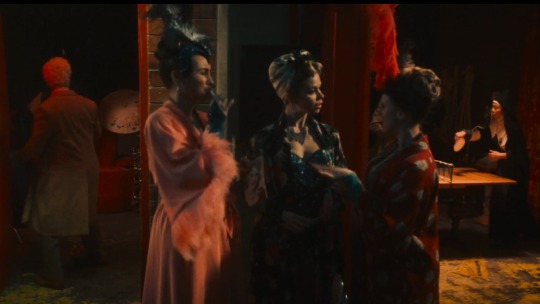
The nightingale
January means one thing: absolutely no migratory birds in Europe yet. They’re blissfully wintering in the warm sun of Northern Africa at the time. But, ironically, when the real nightingales flew off, a certain song about them suddenly gained popularity in the West End of London.
It might be a shock, but A Nightingale Sang in Berkeley Square wasn’t a hit from the start — even though its creators, Eric Maschwitz and Manning Sherwin, were certainly established in their work at this point. The song was written in the then-small French fishing village of Le Lavandou shortly before the outbreak of the Second World War with first performance in the summer of 1939 in a local bar, where the melody was played on piano by the composer Manning Sherwin with the help of the resident saxophonist. Maschwitz sang his lyrics while holding a glass of wine, but nobody seemed impressed. It took time and a small miracle to change that.
Next year, the 23-year-old actress Judy Campbell had planned to perform a monologue of Dorothy Parker’s in the upcoming Eric Maschwitz revue „New Faces”. But somehow the script had been mislaid and, much to her horror, replaced with the song A Nightingale Sang in Berkeley Square. She had never professed to be a singer but even so, she gathered her courage and went out onto the moonlit set dressed in a white ball gown. Her heartfelt rendition of the now evocative ballad captured the audience’s imagination and catapulted her West End career to stardom.
It was precisely 11 April 1940 at the Comedy Theatre in Panton Street and the revue itself proved to be a great success — not only it kept playing two performances nightly through the Blitz, but also returned the next year. And the still operating Comedy Theatre is mere five minutes on foot from the Windmill Theatre, where Aziraphale performed in 1941, and not much longer from his bookshop.
Now, most Good Omens meta analyses focus on Vera Lynn’s version of the song from 5 June 1940, but it didn’t get much attention until autumn, specifically 15 November, when Glenn Miller and his orchestra published another recording. And Glenn Miller himself is a huge point of reference in Good Omens 2.
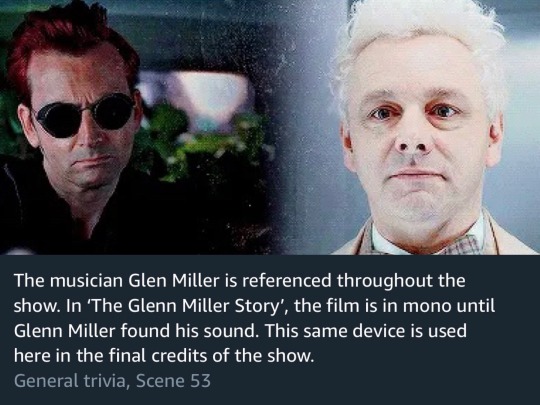
According to the official commentary the infamous credits scene is establishing Aziraphale and Crowley’s final resolve for the next season using the same narrative device The Glenn Miller Story (1954) does in its most crucial scene. It starts with the tune (and audio in general) totally flat, then adds a piano on one side, and gradually becomes fully multidimensional. The Good Omens credits not only emulate the same sound effect, but bring it to the visual side of the narrative by literally combining the individual perspectives of the two characters together. Even though they’re physically apart, their resolve — and love to each other — brings them even closer than before. Aziraphale smiles not because he’s being brainwashed, but because he knows exactly what to do next.
Some of you might have noticed that Tori Amos’s performance for Good Omens is actually a slightly shortened version of Miller’s recording — much less sorrowful than Vera Lynn’s full lyrics that include i.a. this bridge:
The dawn came stealing up
All gold and blue
To interrupt our rendez-vous
I still remember how you smiled and said
Was that a dream or was it true?
Which is a huge hint when it comes to what we can expect from the main romantic plot line in the Good Omens series. The original song introduces an element of the doubt — it seems like there was no nightingale at all, only the mirage woven by the singer clearly intoxicated with love, much like Aziraphale and Crowley for the length of the last six episodes. Crowley’s comment in the season finale might allude to that interpretation, stating that there are no nightingales — never have been. It was all a dream. But the version we’re working with here is short and sweet, and devoid of that doubt. In the Good Omens universe angels were actually dining at the Ritz, the streets were truly paved with stars (or will be shown as such in the next season), and a nightingale really sang in Berkeley Square, as the omniscient, omnipresent, and omnipotent narrator, God Herself, had shown us.
All in all, it’s not an accident that the “modern” swing ballad activating Aziraphale’s memory and opening the 1941 minisode is the Moonlight Serenade by Glenn Miller. It’s a track naturally associated with A Nightingale Sang in Berkeley Square when it comes to music style and the sentiment in the lyrics.
But why the sudden popularity? In the great uncertainty and hardship of the Blitz, A Nightingale Sang in Berkeley Square provided solace and escapism for listeners, offering a glimpse of hope and love amidst the darkness of war. It became a universal anthem of resilience and a reminder of the power of love transcending difficulties. By January 1941 the whole city knew this tune by heart, including a certain West End aficionado with a cabinet full of theatre programs in his bookshop. Thanks to Maggie’s grandmother, he most probably had a record at hand to play during his spontaneous wine night with Crowley. We can only suspect the details, but it was was mutually established as their song exactly at that time or soon afterwards. Pretty sure we will see a third installment of that minisode for many, many reasons, but especially because of this “several days in 1941” answer by Neil:
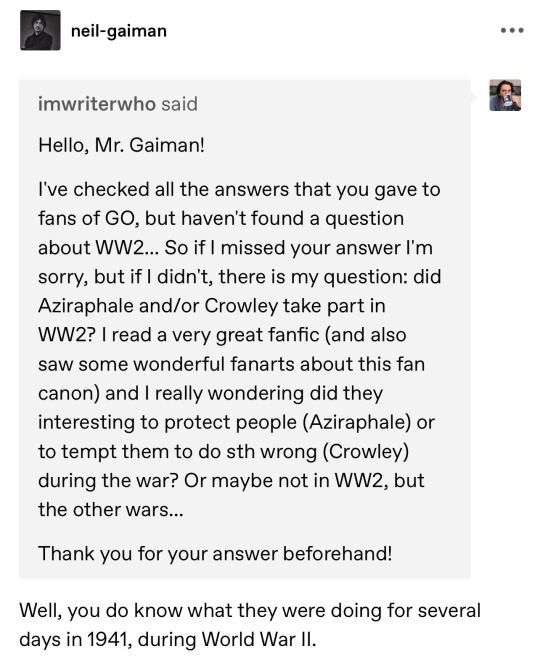
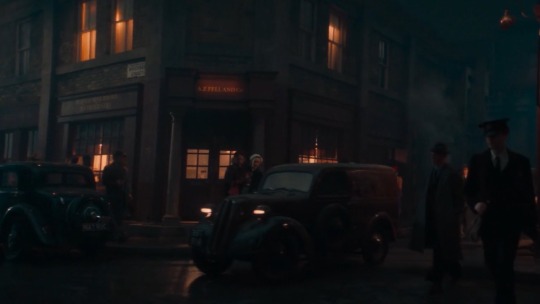
The Man Hunt
In 1941 A Nightingale Sang in Berkeley Square gained even more popularity as the romantic theme of the Fritz Lang’s newest film Man Hunt. The 1939 story by Geoffrey Household first appeared under the title “Rogue Male” as a serial in the Atlantic Monthly Magazine where it received widespread comment, soon becoming a world-wide phenomenon in novel form. Its premise criticizes Britain's pre-war policy of appeasement with Germany, ready to sacrifice its own innocent citizens to the tentative status quo. Sounds a bit like Heaven's politics, right?
Yes, I'm trying to make you watch old movies again — like all the other classics, Man Hunt (1941) is easily available on YouTube and other streaming websites.
The next part will include spoilers, so scroll down to the next picture if you prefer to avoid them.
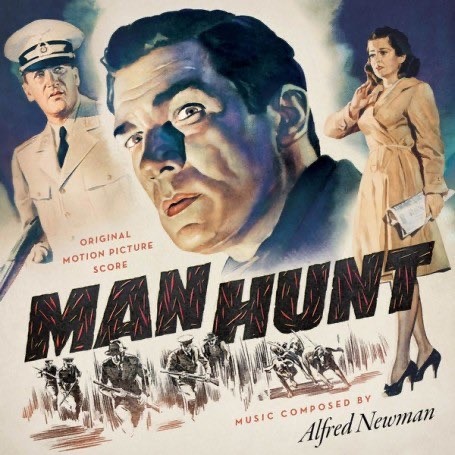
The plot of the movie seems simple enough: the tall, dark, and handsome Alan Thorndike, who nearly assassinates Hitler, narrowly escapes Germany and back in London continues to evade the Nazi agents sent after him with the help of a young trench-clad “seamstress” named Jerry, bridging the class divide and becoming unlikely friends-partners-romantic interests. It doesn’t end well though.
Jerry's small London apartment serves as a hideout for Alan when he was being followed by Nazis, similarly to how Aziraphale's bookshop is a safe haven for both Crowley and Gabriel in S2. She helps the man navigate the streets and eventually out of London — by sacrificing herself and getting forcefully separated from him by a patrolling policeman. The last time they see each other, Alan watches Jerry look back at him yearningly and disappear in the fog, followed by the elderly officer.
Unfortunately in the next scene we learn that the latter is a Nazi collaborator and helps the agents apprehend Jerry in her own flat. Staying loyal to her love and uncooperative, she’s ultimately thrown out of a window to her death, but posthumously saves Alan once again — through the arrow-shaped hatpin he gifted her earlier that is presented to him as the evidence of her off-screen fate.
Long story short, thanks to Jerry’s sacrifice Alan not only survives, but is able to join the war that broke out in the meantime and go back to Germany, armed with a rifle and a final resolve to end what he started, no matter how long will it take. The justice will be served and the dictator will pay with his life for his sins.
I wouldn’t be myself without mentioning that the main villain has a Roman chariot statue similar to the one in Aziraphale’s bookshop, an antique sculpture of St Sebastian (well-known as the gayest Catholic Saint) foreshadowing his demise, and a chess set symbolizing the titular manhunt/game of tag with the protagonist.
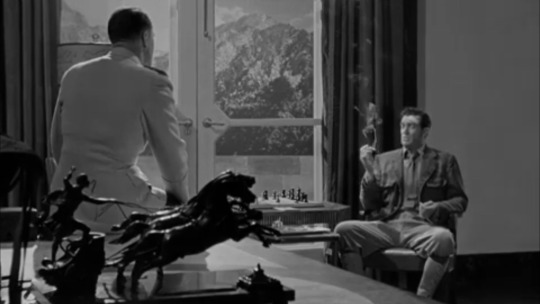
Aziraphale’s song
Will Aziraphale sacrifice himself as well? Or has he already? If his coin magic trick can be any indicator, we should expect at least a shadow of a danger touching the angel’s wings soon.
Let’s sum up the 1941 events from Aziraphale’s perspective: the very first time they’ve interacted after almost a century, Crowley actively sabotaged his entire existence twice by stepping onto a holy ground and by being outed by agents of Hell, both on the very same night and both because of his undying dedication to the angel. That’s enough of a reason not only for performing an apology dance, but also maintaining a careful distance for Crowley’s sake for the next 26 years. Only when he heard that his idiot was planning to rob a church, he gave up since he “can't have him risking his life”.
That’s when Crowley, sitting in a car parked right under his bookshop, offered him a ride. It wasn’t even subtle anymore. It was supposed to be a date, this time both of them understood it. But Aziraphale wouldn’t risk Crowley’s safety for his own happiness, especially not when he can name his feelings towards him and knows that they are reciprocated — the biggest lesson he learnt back in 1941.
So he did what he’s best at, he cut Crowley off again, but this time with a promise of catching up to his speed at some point. Buddy Holly’s Everyday, which was originally planned to play afterwards instead of the Good Omens theme, adds additional context here:
No, thank you. Oh, don’t look so disappointed. Perhaps one day we could... I don't know… Go for a picnic. Dine at the Ritz.
Aziraphale, carefully looking around and feeling observed through the whole conversation in the Bentley, consciously used the “Dine at the Ritz” line from A Nightingale Sang in Berkeley Square, from their song, as a code only the two of them understand. Not as a suggestion to go out for a meal, but a promise. A hope for the privilege of being openly in love and together — maybe someday, not now, when it’s too dangerous — even if it leads to a bad ending.
Fast forward to 2023 when for one dreadful moment Crowley’s “No nightingales” robbed Aziraphale even of that semblance of hope. He looked away, unable to stop his tears anymore. Only their kiss helped him pull himself together and make sure that a nightingale did sing the last time he turned — just like in their song — this time without a smile, as a goodbye.
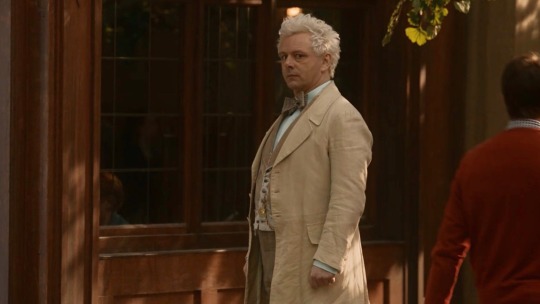
#a nightingale sang in the london blitz#the song is a code#and is miracled as a sign#aziraphale needs a hug#no nightingales#history rant#yuri is doing her thing#the good omens crew is unhinged#neil gaiman#st dunstan-in-the-east#1941 minisode#1941 flashback#a nightingale sang in berkeley square#good omens#good omens meta#good omens 2#go2 meta#go2#ineffable husbands#aziraphale#crowley#1941 aziraphale#1941 crowley#the blitz#man hunt (1941)#the glenn miller’s story (1954)#why am i like this#why do i do this to myself#long post
314 notes
·
View notes
Text
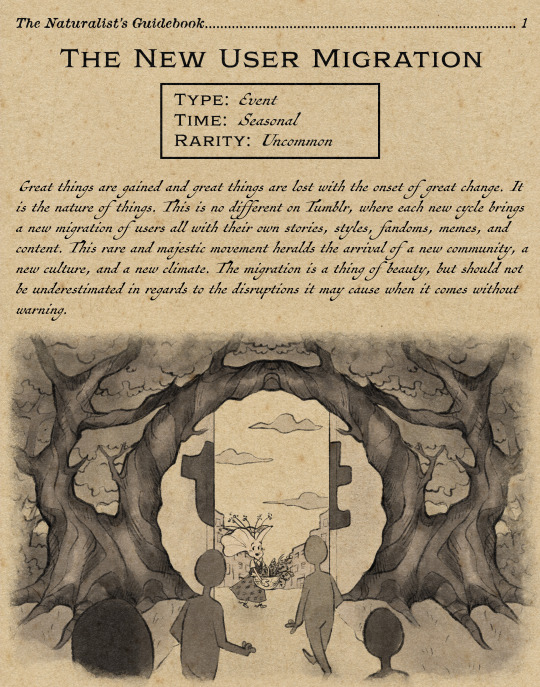
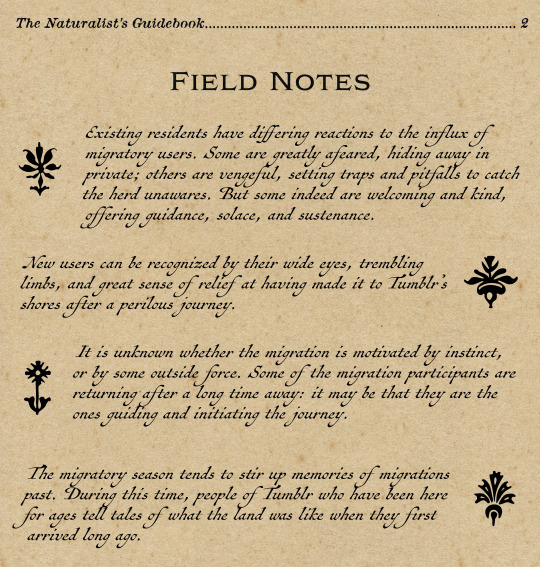
The New User Migration
TYPE: Event
TIME: Seasonal
RARITY: Uncommon
DESCRIPTION:
Great things are gained and great things are lost with the onset of great change. It is the nature of things. This is no different on Tumblr, where each new cycle brings a new migration of users all with their own stories, styles, fandoms, memes, and content. This rare and majestic movement heralds the arrival of a new community, a new culture, and a new climate. The migration is a thing of beauty, but should not be underestimated in regards to the disruptions it may cause when it comes without warning.
FIELD NOTES:
Existing residents have differing reactions to the influx of migratory users. Some are greatly afeared, hiding away in private; others are vengeful, setting traps and pitfalls to catch the herd unawares. But some indeed are welcoming and kind, offering guidance, solace, and sustenance.
New users can be recognized by their wide eyes, trembling limbs, and great sense of relief at having made it to Tumblr’s shores after a perilous journey.
It is unknown whether the migration is motivated by instinct, or by some outside force. Some of the migration participants are returning after a long time away: it may be that they are the ones guiding and initiating the journey.
The migratory season tends to stir up memories of migrations past. During this time, people of Tumblr who have been here for ages tell tales of what the land was like when they first arrived long ago.
4K notes
·
View notes